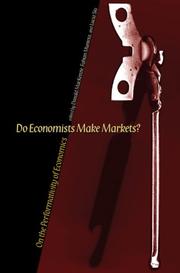| Listing 1 - 2 of 2 |
Sort by
|
Book
ISBN: 1281385875 9786611385873 0821375474 0821375466 Year: 2008 Publisher: Washington, DC : The World Bank,
Abstract | Keywords | Export | Availability | Bookmark
 Loading...
Loading...Choose an application
- Reference Manager
- EndNote
- RefWorks (Direct export to RefWorks)
This title explores an area of tertiary education that is currently understudied; this is the extent and nature of differentiation and articulation in African tertiary education systems. The overall finding is that the binary system is dominant, characterised by universities and polytechnics as distinct types of institutions. Differentiation is clearly evident in Africa. However, though varied in nature and extent, the differentiation is mostly horizontal as opposed to vertical. Articulation, on the other hand, seems to be in its infancy as some universities, in their admission requirements, d
Articulation (Education) --- Education, Higher --- Education --- School management and organization --- Curricula

ISBN: 9780691138497 9780691130163 0691130167 0691138494 0691214662 Year: 2007 Publisher: Princeton (N.J.): Princeton university press,
Abstract | Keywords | Export | Availability | Bookmark
 Loading...
Loading...Choose an application
- Reference Manager
- EndNote
- RefWorks (Direct export to RefWorks)
Around the globe, economists affect markets by saying what markets are doing, what they should do, and what they will do. Increasingly, experimental economists are even designing real-world markets. But, despite these facts, economists are still largely thought of as scientists who merely observe markets from the outside, like astronomers look at the stars. Do Economists Make Markets? boldly challenges this view. It is the first book dedicated to the controversial question of whether economics is performative--of whether, in some cases, economics actually produces the phenomena it analyzes. The book's case studies--including financial derivatives markets, telecommunications-frequency auctions, and individual transferable "as in fisheries--give substance to the notion of the performativity of economics in an accessible, nontechnical way. Some chapters defend the notion; others attack it vigorously. The book ends with an extended chapter in which Michel Callon, the idea's main formulator, reflects upon the debate and asks what it means to say economics is performative. The book's insights and strong claims about the ways economics is entangled with the markets it studies should interest--and provoke--economic sociologists, economists, and other social scientists. In addition to the editors and Callon, the contributors include Marie-France Garcia-Parpet, Francesco Guala, Emmanuel Didier, Philip Mirowski, Edward Nik-Khah, Petter Holm, Vincent-Antonin Lepinay, and Timothy Mitchell.
Economics --- Markets --- #SBIB:33H031 --- 381 --- Economie: operationeel onderzoek --- #SBIB:39A4 --- 330.00 --- AA / International- internationaal --- Public markets --- Commerce --- Fairs --- Market towns --- Economic theory --- Political economy --- Social sciences --- Economic man --- Toegepaste antropologie --- Economische en sociale theorieën: algemeenheden --- Economie politique --- Marchés --- Économie politique --- Économie de marché --- Markets. --- Economics. --- Bayesian learning. --- Homo economicus. --- Nobel Prizes. --- abstraction. --- articulation. --- bank run. --- brokers. --- collaterals. --- concentration of wealth. --- cooperatives. --- cyborgs. --- dead capital. --- dispossession. --- economic engineering. --- embeddedness. --- experimental economics. --- expertise. --- financial engineering. --- framing. --- governments. --- hybridization. --- identities. --- in vivo. --- laboratories. --- legality. --- live capital. --- manipulations. --- mathematics. --- natural entities. --- pickles. --- purification. --- rationality.
| Listing 1 - 2 of 2 |
Sort by
|

 Search
Search Feedback
Feedback About UniCat
About UniCat  Help
Help News
News